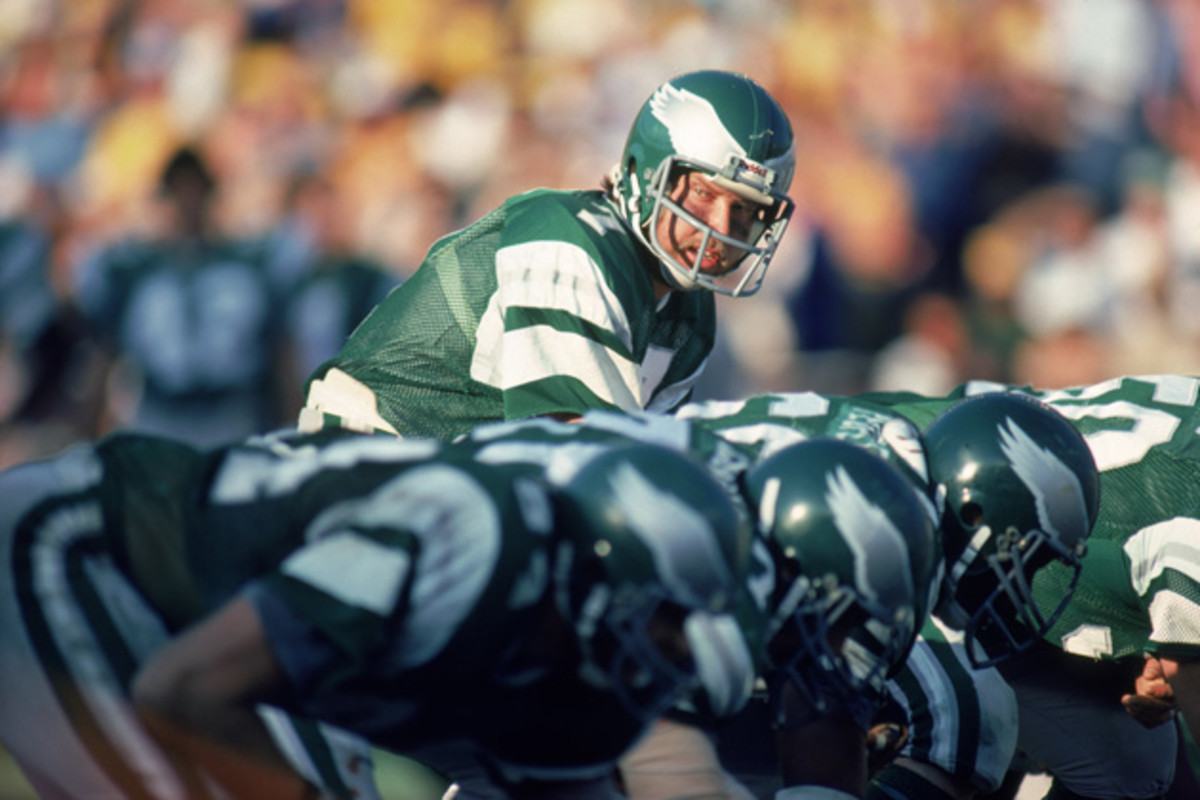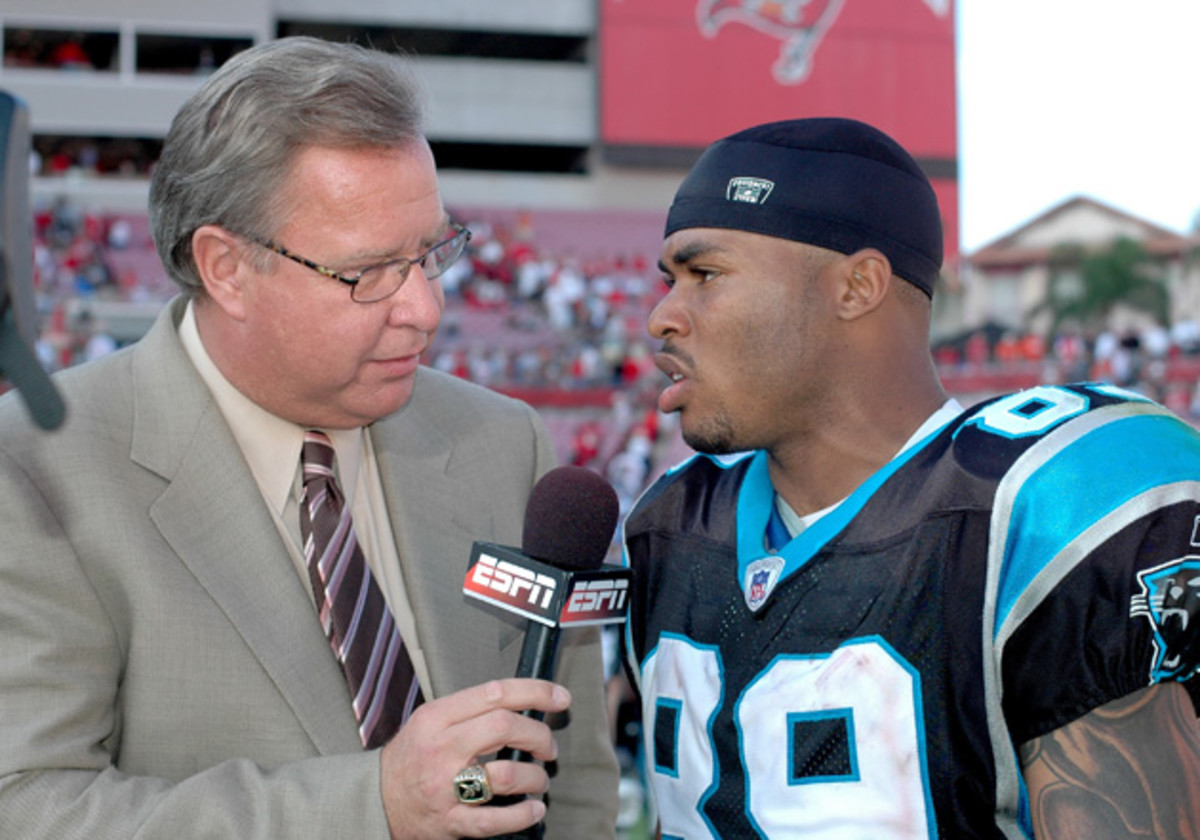Former NFL QB Ron Jaworski has built a chain of profitable golf courses

This story appears in the Sept. 28, 2015, issue of Sports Illustrated. Subscribe to the magazine here.
For those familiar with Ron Jaworski's exuberant, wonkish NFL analysis on ESPN, it's easy to imagine him haunting the film room when he played, consuming game tape at ungodly hours. In truth, the quarterback known as Jaws spent his off days almost as concerned with par-4s as he was 3–4s. "I was away from the media, away from fans, away from talking about the game," he says of his weekly golf outings. "It was where I would recharge my batteries."
Jaworski is seated in a small conference room at Blue Heron Pines Golf Club in Egg Harbor City, N.J., where the same words that frame the back entrance to the clubhouse are embroidered on his orange polo: RON JAWORSKI GOLF. Both setting and shirt are reminders that Jaworski's former refuge from work is now his job. With five courses in New Jersey and Pennsylvania, Jaworski, a 64-year-old father of three who lives in south Jersey with his wife, Liz, has brought the same dogged enthusiasm and eye for detail that characterize his NFL analysis to golf. "It's like he's still a quarterback reading the field," says Ken Kochenour, Jaworski's partner on four of the five courses. "He sees stuff other people don't see. It's uncanny."

Sometimes that means adding an alternate tee; other times, cutting trees to open up a fairway. It's all in the service of playability—one of the four pillars of Jaworski's approach, along with affordability (all of his courses cost less than $100 per round at peak weekend times), atmosphere (each features a sports bar) and a quick pace of play (which on-course rangers are not reluctant to enforce). The model is a crowd-pleaser: Jaworski says each of his courses pulls in six-figure annual profits. "I have never lost money on a golf course," he says, knocking on the wooden table. "I say that proudly because I know a lot of people can't."
One of the keys to his enterprise is its economies of scale, which enable him to purchase everything from fertilizer to clubhouse food in bulk. This spring, after he bought Downingtown (Pa.) Country Club, Jaworski mobilized employees from across his other courses to upgrade Downingtown's 50,000 square feet of notoriously hardpan bunkers. What would have cost more than $110,000 through a contractor was done for $18,000—the kind of efficiency that can be a difference maker in a competitive, seasonal industry. "Your margins are tight, and it can be thankless," says Charlie Clarke, the company's regional superintendent and a Jaworski employee for most of the past 25 years. "If you don't love it, you really shouldn't be out here."
Dan Marino, Damon Huard now teammates in new game: winemaking
Jaworski’s love of the links can be traced to his upbringing in Lackawanna, N.Y., a lunch-pail community of 18,000 south of Buffalo. The son of a Bethlehem Steel mill worker, Jaws was no country club kid, but around age nine he became intrigued by South Park Golf Club, a nine-hole public course near his grade school. With balls scooped from beyond a driving-range fence and mixed bags of clubs, Ron and his friends began sneaking onto the course's 2nd tee for scofflaw rounds. He was smitten.
At 22, he bought a set of Wilson Staffs, his first real clubs. By then he was a second-round pick of the Los Angeles Rams, invited to play in a local celebrity tournament. He put the Wilsons to good use during his three years as a backup in L.A., frequenting courses from Long Beach to Las Vegas. But during his 18-hole escapes he felt a clock ticking. During one of his first years he heard a union rep cite a frightening statistic: The average player's career lasted 3½ seasons. "I was scared to death of the future," he says. "I realized how hard the game is and how dangerous it is."

In 1977 he was traded to Philadelphia, where he found stability on and off the field. Coach Dick Vermeil installed Jaworski as his starter, and in '79, the season before he would lead the Eagles to their first Super Bowl, Jaws and linebacker John Bunting took over operations at The Abington Club in nearby Jenkintown, Pa. A phys-ed and recreation major at Youngstown (Ohio) State, Jaworski enjoyed his first real business experience enough to begin envisioning a second career.
Five years later he learned that a bankrupt course in southern New Jersey was available for sale. It would not come cheap: $1.65 million, more than four times his salary of $400,000. He rechristened the club Ron Jaworski's Eagles' Nest and set about cutting greens, raking traps and riding an F10 mower to trim the rough. "Once you put your own money in the deal," he explains, "it's amazing how quick you learn."

As his NFL career wound down with late-1980s stints in Miami and Kansas City, Jaworski's stable of courses grew. By the mid-1990s he owned a half dozen, whose value was growing during the Tiger-inspired boom. In '98 a group of Wall Street investors approached Jaworski, who told them his properties weren't for sale but he'd be willing to hear their offer. They responded with a bid of more than $17 million. "I remember opening the letter, sitting with my wife," Jaworski recalls. "And I said, 'Well, I guess we're out of the golf business.'"
The absence would be brief. After his noncompete clause expired in 2000, Jaworski bought Valleybrook Country Club in Blackwood, N.J., the charter entry in the new Ron Jaworski Golf portfolio. So ended a year of stewing in a generic business park and hitting the links. "I got a little squirrelly," says Jaworski, who's been as low as a five handicap but now holds a 6.6. "I was probably playing too much too."
During football season Jaworski enjoys no such indulgences. A typical week consists of Tuesday-through-Thursday film study at the NFL Films office in Mount Laurel, N.J.; a Friday of taping his NFL Matchup breakdowns; then Saturday through Monday at either a game site or at ESPN's Bristol, Conn., headquarters for more on-air segments. (From 2007 through '11 he was a colorman on Monday Night Football.) Jaws estimates that between the opening night and the Super Bowl he plays two or three rounds of golf. "ESPN owns me," he says. "And I love it."

Jaworski's football itch is as irrepressible as his attempts to scratch it. He's an co–majority owner of the Philadelphia Soul of the Arena Football League, who won a championship in 2008 and reached their conference championship game this season, and a principal investor in the nascent China American Football League. The latter grew out of what Jaworski calls "one of the most bizarre things that has ever happened in my life." In 2012, Martin E. Judge, another part-owner of the Soul, talked over dinner about his recent business success in China. After a beer or two Jaworski suggested they try to bring football to the country; a few months later the two were in Tiananmen Square, hashing out a deal with China's secretary general. "I'm thinking, I'm this football player from Lackawanna, New York," Jaworski says. "You've got to pinch yourself."
The CAFL is scheduled to kick off next fall with eight teams and 20-player rosters, operating under Arena league rules in a number of Chinese Basketball Association facilities. Jaworski has been bullish about a full-fledged league since a game featuring a mix of AFL stars and local athletes drew 8,000 fans. "It probably won't happen in my lifetime," he says, "but it's gonna happen."
He is upbeat too about Ron Jaworski Golf, which is now in the hands of his son, B.J., its executive vice president. Despite National Golf Foundation statistics indicating a net closure of 143½ courses in the U.S. in 2013, Jaworski sees women and children—often shunned or discouraged by snobbish country clubs but coveted at Jaworski's—as the sport's future. In December he expects to complete his second purchase of the year, Ramblewood Country Club in Mount Laurel. As the NFL season intensifies, he will be eyeing more courses still.
"The numbers are down—that's a reality," he says of the golf industry. "But they're not down for me."
